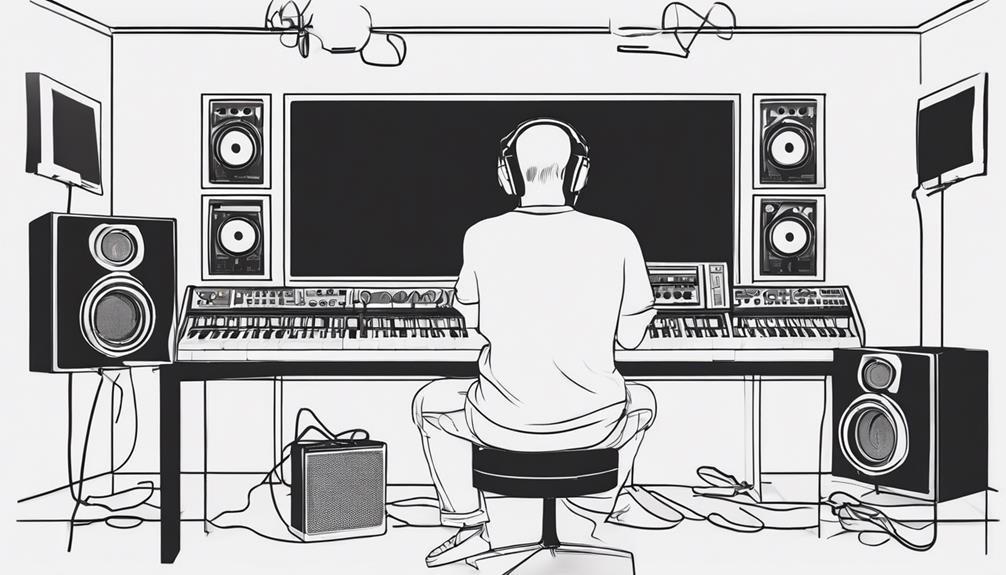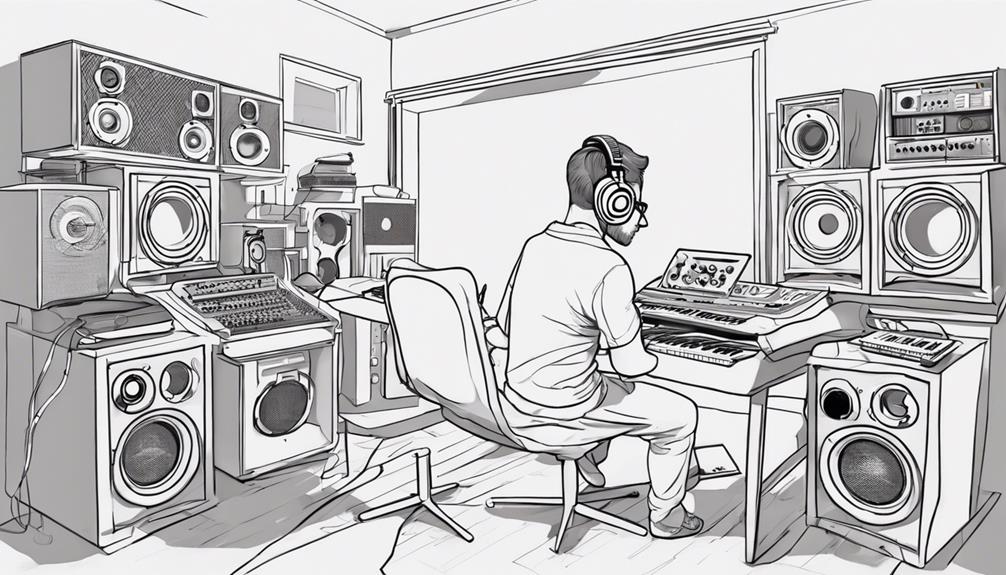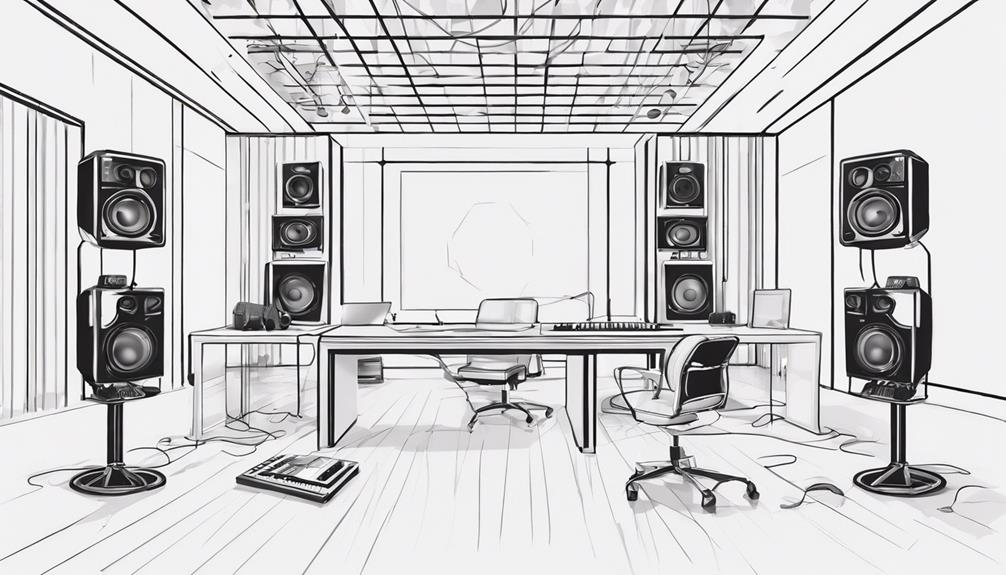To start a music production business, first, define your niche and target audience. Next, establish a strong online presence with a professional website and engaging social media. Invest in quality equipment to showcase your expertise effectively. Build a diverse portfolio to attract a wide range of clients. Network with industry professionals to gain valuable connections. Set competitive pricing strategies based on researched industry standards. Focus on building strong customer relationships for word-of-mouth marketing. Each step will guide you towards successful execution of your music production business idea. Additionally, stay updated with the latest trends and technologies in the music industry to remain competitive. Offer exceptional customer service and tailor your services to meet individual client needs. By following these steps, you can build a solid foundation to start a music production business and thrive in the creative industry. Furthermore, always strive for continuous improvement by seeking feedback from your clients and refining your skills. Diversify your services, such as offering mixing, mastering, or composing for different genres, to expand your reach. By consistently prioritizing creativity and professionalism, you can establish yourself as a trusted resource for those searching for guidance on how to start music production and grow a thriving business in this competitive field.
Key Takeaways
- Identify your music production specialty and target audience.
- Build a professional website showcasing services and portfolio.
- Invest in quality equipment for better sound and reputation.
- Network with industry professionals for collaboration and growth.
- Set competitive pricing strategies to attract clients.
Define Your Niche and Audience
To start your music production business successfully, defining your niche and audience is vital. Within the domain of music production, it's important to identify where your specialty lies. Whether it's focusing on a specific genre like hip-hop or offering services such as recording, mixing, or mastering, honing in on your niche will set you apart in a competitive market.
Understanding your target audience is equally significant. Whether you cater to independent artists, bands, filmmakers, or advertising agencies, knowing who you're serving will help tailor your services to meet their needs effectively.
Researching market demand and trends within your niche will give you insights into what services are in high demand and how you can align your offerings accordingly. Consider factors like geographical location, competition, and industry requirements when defining your niche and audience.
Establish Online Presence
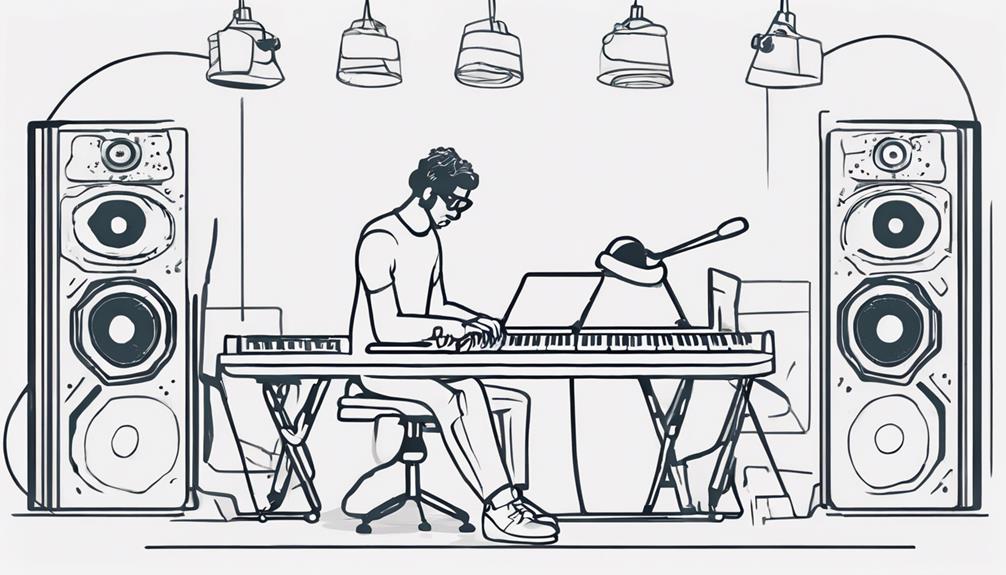
To establish a strong online presence for your music production business, focus on building a professional website that showcases your services and portfolio.
Utilize various social media platforms like Instagram, SoundCloud, and YouTube to share music samples and engage with potential clients effectively.
Build Professional Website
Establishing a professional website is crucial for setting up a strong online presence for your music production business. Your website serves as a central hub where you can showcase your ability to make music, highlight your services, and attract potential clients. Make sure that your website features a portfolio showcasing your best work, client testimonials to build credibility, and a clear contact form for inquiries.
To enhance user experience, incorporate high-quality visuals and multimedia elements that reflect the creativity and professionalism of your music production services. Implementing SEO strategies will help improve your website's visibility on search engines like Google, making it easier for potential clients to find you online.
Remember to regularly update your website with new projects, blog posts, and industry-related content to keep visitors engaged and showcase your ongoing work in the music production field.
Utilize Social Media
Utilizing the power of social media platforms like Instagram, Facebook, and Twitter is essential for establishing a robust online presence for your music production business. Social media offers a direct channel to showcase your work, connect with potential clients, and stay engaged with your audience.
By leveraging targeted advertising on platforms like Facebook, you can reach specific demographics interested in music production services, increasing your chances of converting leads into clients.
Engagement is key on social media. Share behind-the-scenes content, client testimonials, and industry insights to build credibility and trust with your followers. Use the analytics tools provided by these platforms to track important metrics like engagement rates, audience demographics, and content performance. This data will help you optimize your social media strategy for better results.
Collaborating with influencers, musicians, and industry professionals on social media can also help expand your reach and establish valuable partnerships. By actively participating in the social media community, you can elevate your music production business and attract a larger audience.
Invest in Quality Equipment
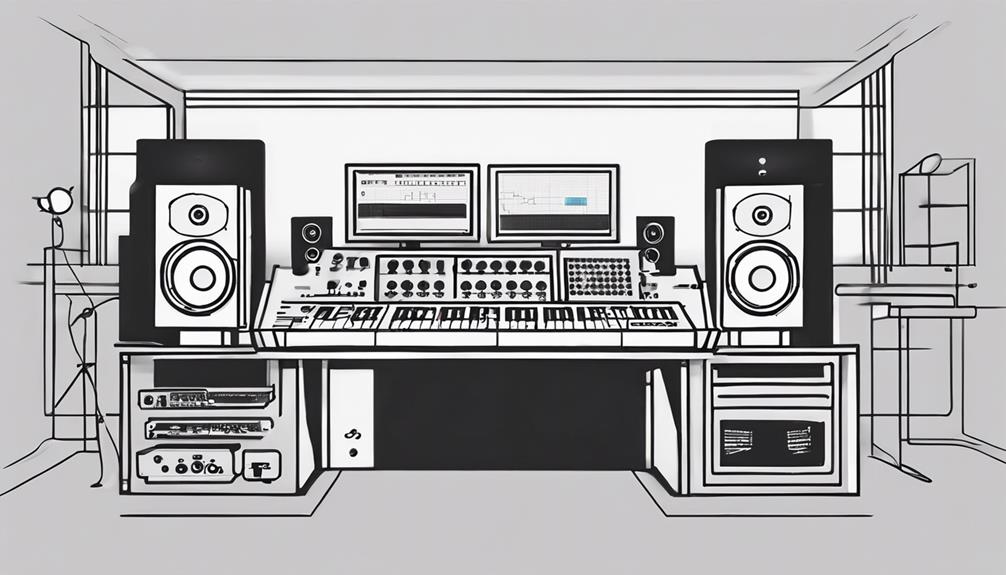
When starting your music production business, prioritize investing in high-quality recording equipment like microphones, audio interfaces, and studio monitors for that professional sound.
Opt for software such as Pro Tools, Logic Pro, or Ableton Live to enhance your music production and editing capabilities.
Equipment Investment Tips
Why is investing in high-quality equipment essential for your music production business success?
When setting up your music studio, it's important to prioritize quality over quantity when it comes to equipment. Opting for excellent studio monitors, microphones, and audio interfaces can greatly impact the sound production quality.
High-quality equipment not only enhances the overall production value of your music but also helps attract more clients seeking professional-grade services.
To make sure you're making the right investment, choose equipment from reputable brands known for their reliability and performance in the music production industry. By investing in dependable gear, you can experience better sound quality, increased efficiency, and improved workflow in your music production business.
Consider the long-term benefits of quality equipment, as it can ultimately help you deliver exceptional results and establish a strong reputation within the industry. Remember, quality equipment is a cornerstone of success in the music production business.
Quality Over Quantity
Prioritizing quality over quantity in your music production business equipment is essential for achieving professional sound production results. Investing in high-quality recording equipment such as microphones, interfaces, and studio monitors can greatly enhance the production value of your music. Quality gear not only attracts more clients and opportunities but also leads to better final products, increasing customer satisfaction and generating positive word-of-mouth referrals.
In a competitive market, having premium equipment can help you stand out and showcase your commitment to excellence in music production. Additionally, investing in quality gear can result in higher production efficiency, ultimately saving you time and resources in the long run. Remember, when it comes to your music production business, investing in quality equipment is an important step towards success.
Build a Portfolio
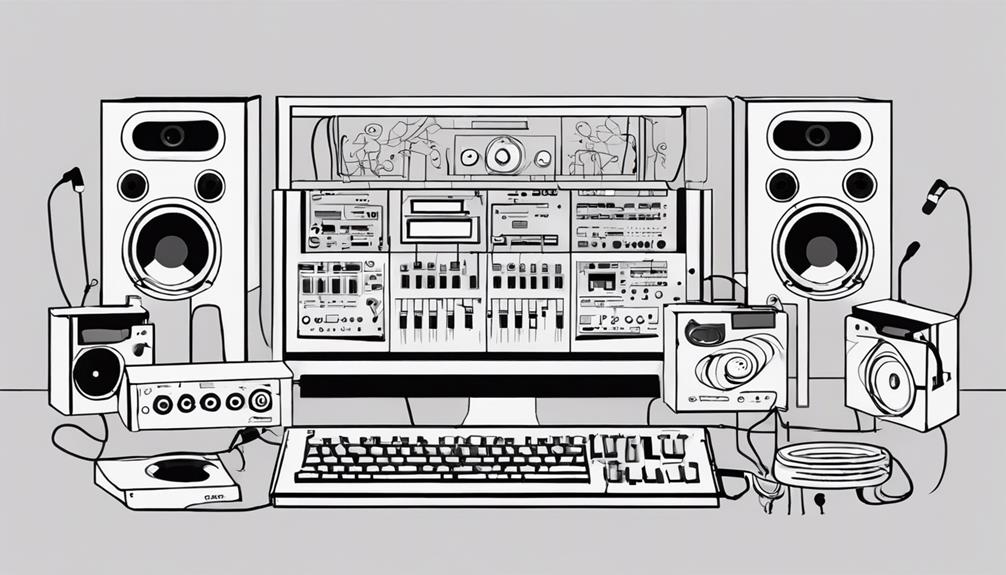
To effectively showcase your music production skills and attract clients, make sure your portfolio includes a diverse range of projects across various genres, styles, and formats.
Here are three key tips to help you build a strong portfolio:
- Showcase Versatility: Include samples of different music genres, production styles, and formats to illustrate your ability to work across a broad spectrum of projects. This will attract a wider range of clients who are looking for diverse skills.
- Highlight Collaborations: If you've worked with well-known artists or industry professionals, be sure to showcase these collaborations in your portfolio. This will help establish credibility and show potential clients that you have experience working with established names.
- Regular Updates: Keep your portfolio current by adding new projects regularly. This demonstrates growth, innovation, and a commitment to staying relevant in the ever-evolving music production industry. Regular updates also show potential clients that you're actively working and producing new content.
Network With Industry Professionals

Engage actively with industry professionals by attending events, utilizing online platforms, and collaborating on projects to expand your music production network. Industry events like music conferences and workshops provide excellent opportunities to connect with established professionals.
Online platforms such as LinkedIn and industry forums offer accessible ways to network with industry professionals and build relationships. Collaborating on projects with other music producers, artists, and industry professionals not only helps expand your network but also provides valuable experience in the field.
Joining local music production groups or associations can connect you with like-minded individuals and keep you updated on industry trends and opportunities. Additionally, seeking mentorship from experienced music producers can offer valuable insights, advice, and guidance on building a successful music production business.
Set Pricing Strategies

Research successful pricing strategies utilized by music production businesses to establish competitive rates for your services. Consider factors like studio equipment costs, overhead expenses, and industry standards when setting prices.
Offer different pricing packages for services like recording, mixing, mastering, and production to cater to a variety of clients.
To effectively set pricing strategies for your music production business, you should try the following:
- Analyze Costs: Break down all your expenses, including equipment maintenance, software licenses, and rent, to guarantee your pricing covers these costs while generating profit.
- Competitor Research: Study the pricing models of other music production businesses in your area to stay competitive and attract clients.
- Value-Based Pricing: Consider the value you provide to clients and set prices accordingly. Highlight the benefits of your services to justify your rates and attract quality customers.
Focus on Customer Relationships

Building strong customer relationships is essential in the music production business as they're key to fostering repeat business and generating referrals. In this industry, establishing trust and loyalty through effective communication and understanding of client needs is paramount.
By cultivating relationships with artists, producers, and record labels, you have the opportunity to develop long-term partnerships and collaborations that can elevate your business.
To excel in customer relationships, prioritize providing exceptional customer service and personalized experiences. Going the extra mile to meet and exceed client expectations can differentiate your music production business from competitors.
Not only does this approach enhance client satisfaction, but it also sets the stage for valuable feedback, word-of-mouth marketing, and a strong reputation within the music industry.
Frequently Asked Questions
How Do I Start My Own Music Production Business?
To start your own music production business, identify your niche, invest in high-quality equipment, build a portfolio by collaborating with local artists, network with industry professionals, and stay updated on trends for a competitive edge.
How to Execute an Idea Startup?
Start by creating a detailed plan outlining services, target market, and financial projections. Secure necessary equipment and build a network of collaborators. Promote your business through social media and events. Continuously refine skills and deliver quality services.
How to Start a Music Business?
To start a music business, research the industry, create a business plan, invest in quality equipment, network with professionals, and stay updated on regulations. Building relationships, providing excellent services, and marketing effectively are key to success.
What Is a Production Company Music?
Imagine a hub where melodies are sculpted, beats are born, and harmony resides. A music production company orchestrates this symphony, collaborating with artists, managing recording, mixing, mastering, and distribution to create musical masterpieces.
Conclusion
So there you have it, you've got the tools to kickstart your music production business. Remember, Rome wasn't built in a day, so take it step by step and watch your dreams become reality.
Keep your ear to the ground, stay ahead of the curve, and soon enough you'll be hitting all the right notes in the industry.
Good luck on your journey to music production success!


